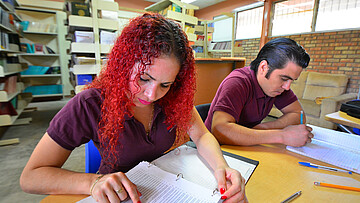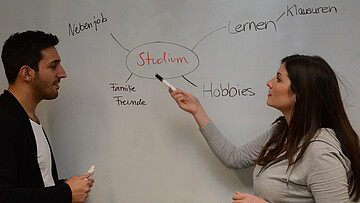regulations, dates, contact persons, etc., per degree programme
Information of the Academic Examination Office
Examination dates
To the pages of the Examination Boards
Notes on the obligation to be present
There is no compulsory attendance at lectures and exercises. Students therefore do not always have to attend these courses. Nevertheless, it is advisable to be present at all times, as this is the only way to get all the important information. Attendance is compulsory for projects and laboratories.
If you are unable to come to an appointment with compulsory attendance, please notify the lecturer in advance.
selected types of assessment
-
term paper
A term paper is an independent written work of a subject-specific or interdisciplinary task.
-
written examination (without a voting system)
A written examination is a written or electronic assessment completed under supervision.
-
written examination with a choice of answers
A written examination is a written or electronic assessment completed under supervision. Written examinations can be conducted in parts according to the answer selection procedure (e.g. single-choice, multiple-choice).
-
oral examination
The oral examination shall not take place in public in the presence of an observer who himself/herself possesses the qualification to be determined by the examination or an equivalent qualification. The main subjects of the examination performance are recorded in minutes. Students who wish to take the same examination at a later examination date, as well as other members of the university who claim their own legitimate interest, are to be admitted as listeners to oral examinations. This does not extend to advice and notification of the examination result to the person(s) to be examined. At the request of the person(s) to be examined, listeners are to be excluded.
-
academic research paper
In an academic research paper a subject-specific or interdisciplinary topic is addressed in theoretical, experimental or constructive respect and the developed solutions are presented and explained in a manner usual for the professional activity.
The scope of work is bindingly defined in the appendix (in months or hours). The topic of a student research project can be suggested by any professor in the fields of Electrical Engineering or Information Technology of the Faculty of Electrical Engineering and Computer Science. The topic of the project work is determined by the examiner after hearing the examinee. The task and a time schedule must be fixed with the issue of the topic. During the preparation of the paper the examinee is supervised by the examiner. The time from the issue of the topic to the delivery of the thesis is six months. The topic of a paper can only be returned once and only within the first eight weeks of the submission period.
Two copies of the paper must be submitted to the office appointed by the board of examiners by the deadline; the date of submission must be recorded. The progress of the work may also be taken into account in the assessment. As a rule, the paper is to be assessed within four weeks of its submission.
-
course-accompanying examination (VbP)
A course-accompanying examination (VbP) deals with a question relating to a specific course and is taken during the semester. A VbP can consist of several partial examinations; the number is to be limited to four partial examinations.
frequent course types
-
lecture
In a lecture mainly theory is taught. Lectures usually take place in a large room or lecture hall where many students are sitting. There is a lecturer (professor or scientific assistant of the professor) who explains the lecture material on the blackboard or with the help of a presentation. In the lecture you will learn the exam material, get information about the contents of the exam and about learning aids (textbooks, scripts, formula collections etc.).
-
lecture hall exercises
Lecture hall exercises also take place in a large room with many students. Unlike a lecture, an exercise uses the material from the lecture. The trainer calculates exercises on the blackboard, which you should follow and write down. In contrast to a lecture, students can ask questions at any time. However, there is usually not enough time to work through the exercises in the lecture hall.
-
group exercises
Group exercises take place in groups of a maximum of 30 students. Usually there is one exercise sheet per week, which is worked out together during the exercise. The exercise is done by students alone or in small groups. During this time, the exercise leaders answer questions and present the sample solution at the end of the exercise.
-
laboratory
In a laboratory, the contents learned in lectures and exercises are applied practically. The students form small groups in which they carry out an experiment. Before each experiment, the supervisor gives the students a script to prepare for the experiment. At the beginning of the laboratory there is almost always a pre-test. The supervisor wants to find out whether all participants are well prepared for the experiment. If they are not sufficiently prepared, he can exclude participants from the experiment. This is followed by the execution of the experiment. During this process, the participants usually record measurement data that they are to evaluate later. The topics can be very different, e.g. a black box measurement of an electrical component and recording the corresponding characteristic curve. After evaluating the measurement data, the participants are often asked to write a test report stating what was processed during the test and what the results are. In a final post-test certificate your performance for the respective test is evaluated. Protocol, pre-test and the cooperation in the execution of the test are evaluated individually for each participant. A laboratory contains 8 to 10 different experiments, which the students have to pass.
-
Studium Generale
The "Studium Generale" is a name for one or more freely selectable courses. These courses actually belong to other courses of study. The courses must either end with an examination or be a foreign language course of the Fachsprachenzentrum. You can find further information on the pages of the ET & INF examination boards (only in German).











